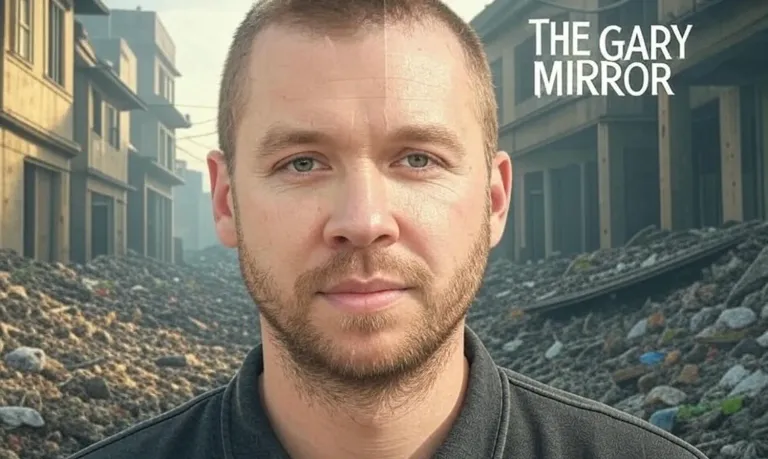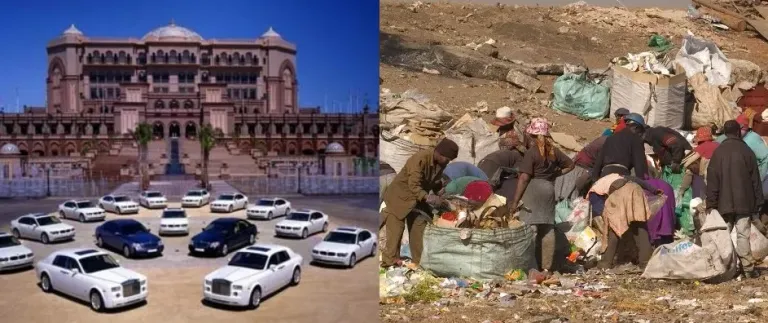https://peakd.com/hive/@meno/economy-thinking-of-distribution
As i found Gary's content interesting, i shared it around a bit. Only to be met with some pretty strong arguments for sharing.A few weeks ago i was turned on to a video of a guy called Gary Stevenson by @meno I watched that video and ended up fully going down this rabbit hole of economics and inequality. Here is his post
It would seem in the realm of economic discourse, few recent voices have sparked as much division as Gary Stevenson’s. A former trader turned best selling Author and YouTube commentator, Stevenson has carved out a space where he tackles wealth inequality with a bluntness that resonates deeply with some and repels others just as fiercely. His message—centered on the growing chasm between the ultra-wealthy and everyone else—taps into a visceral frustration felt by many, yet it also ignites skepticism and outright rejection from those who see it as either impractical or dangerous. What is it about his ideas that elicits such starkly opposing reactions? And what does this split reveal about human psychology and our relationship with systemic problems?
Stevenson’s core thesis is straightforward: inequality is accelerating, extreme wealth is shaping the rules of the game, and ordinary people are being squeezed while the rich dodge accountability. He argues that the middle and working classes bear an unfair tax burden, while the ultra-wealthy hoard resources and influence, rigging the system to their advantage. It’s a narrative that’s not new—economists and activists have sounded similar alarms for decades—but Stevenson delivers it with a raw, unpolished energy that cuts through the noise. He’s not a polished academic or a career politician; he’s a self-described “street kid” who made it big and now wants to lift the curtain on how the world really works. For some, this authenticity is a breath of fresh air; for others, it’s a red flag signaling oversimplification or opportunism, the new grifter on the block.
(fair use, i discovered image on line searching for wealth and poverty side by side)
The reactions to Stevenson’s ideas often fall into two camps. On one side, there’s an enthusiastic embrace from those who feel seen and validated. His message gives words to a quiet despair—that no matter how hard they work, the deck feels stacked against them. It’s not just about money; it’s about the erosion of hope, the sense that the system rewards a select few while leaving the rest to scramble. For these individuals, Stevenson’s call to “stick together” and confront inequality head-on is empowering. It’s a rallying cry that suggests collective awareness and action might shift the tide, even if the path forward isn’t fully mapped out. His lack of polished solutions doesn’t deter them; instead, it’s the act of naming the problem so plainly that feels revolutionary.
On the other side, there’s a visceral pushback from those who see his rhetoric as either defeatist or dangerously divisive. Critics argue that Stevenson’s focus on systemic flaws strips away personal agency, painting a picture of a world where individual effort is futile against an all-powerful elite. They question his practical solutions—or lack thereof—pointing out that railing against the rich or demanding tax reform doesn’t offer a clear roadmap for the average person to improve their life. Some go further, labeling his ideas as a gateway to class warfare or a rehash of failed ideologies like socialism, citing history’s grim track record of such experiments. For these skeptics, his message risks fostering resentment rather than resilience, encouraging people to blame external forces instead of seizing control of their own destinies.
For a simple Butt like me, i tend to appreciate raw presentation and blunt delivery. If feels authentic and gives words to a nagging feeling i have had in the past years that society seems set for a big painful crash.
For me Gary highlights a modern polarization and it isn’t just about economics—the way people react to him feels like it’s opening a window into human psychology. People tend to gravitate toward narratives that align with their lived experiences and emotional needs. Those who’ve felt the sting of financial struggle might find comfort in Stevenson’s acknowledgment of systemic barriers; it absolves them of the guilt that comes with not “making it” in a culture that fetishizes the self-made success story. Conversely, those who’ve clawed their way up—or who believe in the power of grit—might recoil at what they perceive as a victim mindset. It threatens a worldview where hard work and smart choices are the ultimate arbiters of fate. Both reactions are less about Stevenson himself and more about what his ideas reflect back to the listener: a mirror of their fears, hopes, or deeply held beliefs.
There’s also an element of projection at play. Supporters often see him as a truth-teller, a rare voice willing to call out the emperor’s lack of clothes. Critics, meanwhile, cast him as a grifter or ideologue, cherry-picking flaws in his arguments to dismiss the whole. Neither side is entirely wrong—Stevenson’s passion can feel both genuine and belligerent, his ideas both insightful and underdeveloped—but the intensity of the response suggests something deeper. When people hear him speak, they’re not just wrestling with his points; they’re grappling with their own relationship to power, fairness, and responsibility. Do we fight the system, or do we master it? Can we do both? These are questions that hit at the core of how we see ourselves and our place in the world.
(fair use, discovered images demonstrating wealth and poverty extremes)
What’s fascinating is how Stevenson’s ideas, despite their simplicity, expose this fault line in human nature. His call for awareness—about wealth’s influence on media, politics, and resources—strikes a chord because it’s undeniably happening. Post-World War II, high taxes on the rich fueled a robust middle class in many nations, a historical precedent that lends credence to his broader point about wealth distribution.
But we live in a global society now, nomadic tax dodging permeates our modern world, whether individual or corporate. Is taxing the wealthy even possible in our time. If a country does it, people and businesses just pick up sticks and move to Barbados, Dubai, or whatever new place is trying to attract the cash flow with promises of a lower tax burden or labor costs.
Yet does this leap into modern awareness mean we should not be called to action, do we give up to the hopelessness as the divide widens.
For some, in Gary they hear a spark of possibility, a chance to rethink a broken system; others hear a siren song of futility, a distraction from the tangible steps one can take—like saving, investing, or building something new.
Ultimately, Stevenson’s polarizing presence might be less about the man or his message and more about what we bring to the table when we encounter him. His ideas don’t exist in a vacuum—they land in a world already brimming with tension, where inequality is a raw nerve and solutions feel elusive. Whether he’s a catalyst for change or a lightning rod for debate, the reactions he provokes reveal a truth about us: we’re drawn to voices that challenge our assumptions, even if we fight them tooth and nail. And maybe that’s the real value here—not in agreeing with him, but in the messy, human act of wrestling with these ugly realities that shape and increase inequality and that Gary has laid bare.



The challenge about change is that it doesn't happen evenly or neatly. Wealth transfer is an element of capitalism and has been happening progressively, but as time passes, it is speeding up, aided by the global digital economy, and took a transformative leap during the pandemic. Alongside that we still have many prevailing and conflicting ideologies stemming from the world as it was in the mid-twentieth century.
Gary is, as you say, opening up the debate and naming it. It's interesting that the Labour government have asked to come on to his podcast - it means he is getting through, which is something, and the money is on the government not liking it (video and discussion here).
Your pictures are interesting: there are many places in London, the King's Road, for one, where on one side of the road, the household income is about £10,000pa and on the other, in excess of £100,000pa (not specially high for London, but illustrative of the inequality).
Thanks for publishing the post.
Yeah, i saw that video about labor wanting to come on. I think he should do it. To me all these debates that he is doing is where real progress can happen. From getting better at his presentation and remaining calm to actually exchanging ideas and adapting. I watched a great debate he did on diary of a ceo last week. I left thinking that the real answers lie somewhere in the in between of the arguments and points.
The example of after world war 2 we taxed the rich and had a time of the strongest middle class is and was true for then... our world is very different now.
Aspects could be repeated, but the same approach wouldn't work today. So adaptation to the idea of taxing the rich is where we all need to think out of the box.
I'm into an idea of being rational. The willingness tax. Tax me, but let me control how a portion of my taxes are spent.
I'm into this idea for all wealth categories. Imagine if you could choose where 25%-50% of your tax money went. When we paid our taxes we could fill in a box and say, i want ...% to go to schooling, and this % to go to welfare.
Another person could say i want 100% to go toward military.
If we could vote where a % of are tax money headed, it would force areas of government to justify themselves and prove they are worthy of us sending a % to them.
Rather than bloated beuracracies that receive money with little accountability. Flip the script and empower people to put their money toward the things they see as important, and force the areas of government to prove their value to the people.
I dunno, my real point is, through dialogue and debate, through looking directly at issues instead of away from them...thats when we stumble into the answers.
Thanks for coming and visiting my post!
Sort of a DHF for where our taxes go? If this could be modified to support things for a number of years so there is sustainable funding to see things through, that would be good.
There are some places where smaller versions of this are being piloted, something like community accounting where there is a pot for a service or activity and the community decides expenditure.
I agree, debate, or sometimes, even just conversation explaining something, are really important. We have moved back to in person meetings (usually 25-30 people in a meeting) as the dialogue is richer and deeper. We had an issue over the summer last year where there were a lot of polarised views (some of those exacerbated by the behaviour by one of the regional authority) but an open conversation in one of our in person meetings, where everyone had a chance to understand what was happening, turned everything around. It was a very quiet and ordered conversation - no raised voices or anger (or frustration at not being heard), but I guess some of that is that these people have been working together for many years and the meetings are well-managed - people know they will get an opportunity to speak.
Your comment is upvoted by @topcomment
Info - Support - Discord
Thank you.
The thing is, Gary isn't saying anything new. He is basically preaching exactly what Marx did over 150 years ago. Back when the working class was open to those idea, it led to real change in the US. The 8 hr work day, the 40 hr workweek. The pressure to appease the working class and prevent a workers revolution greatly influenced the New Deal, which in turn created the huge middle class the US had for so long.
Old ideas, but a new presentation. He is putting a nice spin on all these ideas that is attractive.
your name may be booster, but i had to boost you, because this is a good point.
Agreed its nothing new. its his presentation i find refreshing.
And i also think we need reminding of our collective power. When workers and everyday people stand together as you mentioned happened around the new deal, change happened through that pressure. Recognizing that on Mass we can create change is a very important aspect of his message in my eyes.
Our world is often fractured and contentious, i appreciate a simple rally cry!
Thanks for giving your input!
I think his rhetorical style fits the time and he packages his message well.
I wonder if he will accept the politicians that apparently wants to appear om his channel. Thats a testimomy to how much influence he is starting to get in UK.
I hope he does, id like to see that discussion/debate.
Yeah can be an interesting discussion. I also hope he invites the other parties as well, so its just not labour.
This guy sounds like a real dickhead.. imma have to check him out.. maybe we can be friends
He is a bit of a belligerent wanker...but i find that indearing.
Ill be curious your take.
His most popular video is called, what Elon musk really wants. That video pulls out the hate and love in the comments
He is a bit of a belligerent wanker
Understatement of the year.. immediately his voice was like nails on the chalkboard.. but the mf'er made some good points
I'm glad you went down this rabbit hole my friend. I've learnt a lot from his videos too.
Yeah, me too, even the debates/arguments I've gotten into since have been enlightening.
two people can hear the same message and walk away with completely different opinions and views. I guess we all see the world through our own lens
We truly do, the danger is when people close down and dig in. We should be open enough in this life to be swayed.
Nothing is black and white, there are always shades of grey.
absolutely shades of grey everywhere
@buttcoins, I paid out 0.291 HIVE and 0.066 HBD to reward 7 comments in this discussion thread.